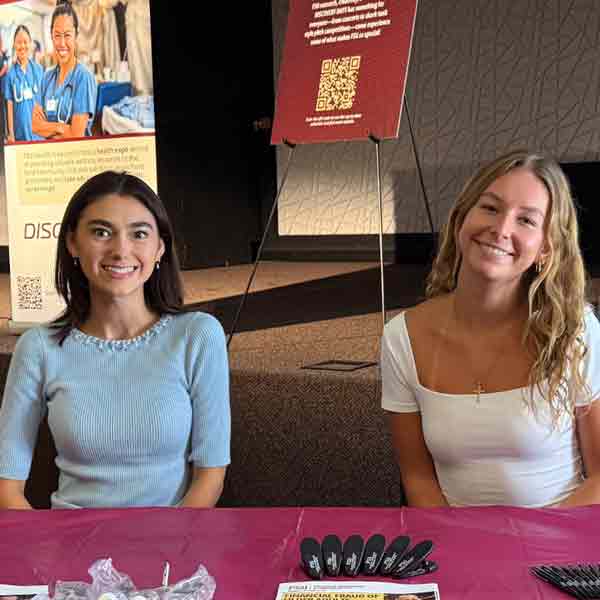
The FSU Health Expo at the Wakulla County Community Center last month aimed to provide visitors information that will help improve their lives.
For two Florida State University College of Criminology and Criminal Justice students, the event proved to be an opportunity to see firsthand how their work is delivering on the college’s commitment to research that translates to the real world.
Haley Nelson, a first-year, doctoral student from Tampa, Florida and Hayley Little, a junior from Orange County California, attended on behalf of the Aging Adult Fraud Research and Policy Institute, which is housed in the college’s Center for Criminology and Public Policy Research.
The event, entitled “FSU Health Expo: Bridging Community, Health and Research,” was held Oct. 18, and offered Nelson and Little a wealth of reminders that the effects of financial fraud of older adults are far reaching.
“It seemed that everyone we talked with had a story,” Nelson said. “Everyone had a parent, a grandparent or a family friend that had experienced, or were nearly victims of, financial fraud.”
Assistant Professor Julie Brancale attended the health expo as well and, like Little and Nelson, fielded questions from those in attendance. Brancale, who is the co-director of the institute, said the need for educating older adults and their support networks is clear.
“Not only is the financial fraud of older adults rapidly growing, but the tactics that scammers use are increasing in their sophistication—making avoiding victimization more and more difficult,” Brancale said. “Older adults must keep up to date with commonly occurring scams to build and maintain their skepticism, which is fundamental to reducing their risk of being scammed.”
Nelson and Little are currently working on a survey for the institute, gathering information on the crime and its victims throughout the state.
“It’s a very under-studied area, especially here in Florida given that we have a larger population of older adults,” Nelson said. “We are trying to identify how often it occurs, why it goes underreported, what measures victims take to protect themselves and what works to protect them. We need to put that information out there so people can protect themselves.”
For Little, the personal stories helped shed light on the pervasiveness of new technologies —artificial intelligence, in particular— fraudsters are using to con older adults.
“It is really interesting to hear firsthand, people saying their mom got a call from someone that sounded just like a relative, saying they need to send bail money immediately for their grandson,” she said. “The more work I do in this field, and the more people I listen to, the more prevalent I see that it is.”
Little added: “You see the statistics in class but you never know how big of an issue it is until it’s in front of you.”
For more information, visit Aging Adult Fraud Research and Policy Institute.
